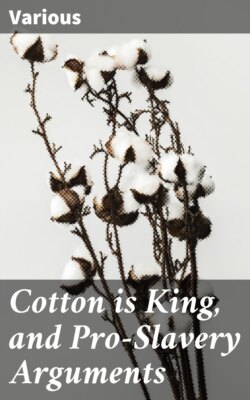Читать книгу Cotton is King, and Pro-Slavery Arguments - Various - Страница 15
На сайте Литреса книга снята с продажи.
ОглавлениеCharacter of the Slavery controversy in the United States—In Great Britain—Its influence in modifying the policy of Anti-Slavery men in America—Course of the Churches—Political Parties—Result, Cotton is King—Necessity of reviewing the policy in relation to the African race—Topics embraced in the discussion.
The controversy on Slavery, in the United States, has been one of an exciting and complicated character. The power to emancipate existing, in fact, in the States separately and not in the general government, the efforts to abolish it, by appeals to public opinion, have been fruitless except when confined to single States. In Great Britain the question was simple. The power to abolish slavery in her West Indian colonies was vested in Parliament. To agitate the people of England, and call out a full expression of sentiment, was to control Parliament and secure its abolition. The success of the English abolitionists, in the employment of moral force, had a powerful influence in modifying the policy of American anti-slavery men. Failing to discern the difference in the condition of the two countries, they attempted to create a public sentiment throughout the United States adverse to slavery, in the confident expectation of speedily overthrowing the institution. The issue taken, that slavery is malum in se—a sin in itself—was prosecuted with all the zeal and eloquence they could command. Churches adopting the sin per se doctrine, inquired of their converts, not whether they supported slavery by the use of its products, but whether they believed the institution itself sinful. Could public sentiment be brought to assume the proper ground; could the slaveholder be convinced that the world denounced him as equally criminal with the robber and murderer; then, it was believed, he would abandon the system. Political parties, subsequently organized, taught, that to vote for a slaveholder, or a pro-slavery man, was sinful, and could not be done without violence to conscience; while, at the same time, they made no scruples of using the products of slave labor—the exorbitant demand for which was the great bulwark of the institution. This was a radical error. It laid all who adopted it open to the charge of practical inconsistency, and left them without any moral power over the consciences of others. As long as all used their products, so long the slaveholders found the per se doctrine working them no harm; as long as no provision was made for supplying the demand for tropical products by free labor, so long there was no risk in extending the field of operations. Thus, the very things necessary to the overthrow of American slavery, were left undone, while those essential to its prosperity, were continued in the most active operation; so that, now, after more than a thirty years' war, we may say, emphatically, Cotton is King, and his enemies are vanquished.
Under these circumstances, it is due to the age—to the friends of humanity—to the cause of liberty—to the safety of the Union—that we should review the movements made in behalf of the African race, in our country; so that errors of principle may be abandoned; mistakes in policy corrected; the free colored people taught their true relations to the industrial interests of the world; the rights of the slave as well as the master secured; and the principles of the constitution established and revered. It is proposed, therefore, to examine this subject in the light of the social, civil, and commercial history of the country; and, in doing this, to embrace the facts and arguments under the following heads:
1. The early movements on the subject of slavery; the circumstances under which the Colonization Society took its rise; the relations it sustained to slavery and to the schemes projected for its abolition; the origin of the elements which have given to American slavery its commercial value and consequent powers of expansion; and the futility of the means used to prevent the extension of the institution.
2. The relations of American slavery to the industrial interests of our own country; to the demands of commerce; and to the present political crisis.
3. The industrial, social, and moral condition of the free colored people in the British colonies and in the United States; and the influence they have exerted on public sentiment in relation to the perpetuation of slavery.
4. The moral relations of persons holding the per se doctrine, on the subject of slavery, to the purchase and consumption of slave labor products.
